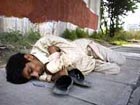| Videos | ? Latest |
|
? Feature | ? Sports | ? Your Videos |
Pakistan fights against poverty

With Sunday being World Poverty Day, let's remember the victims, who often also face violence and hunger. Our correspondent Danial Khan takes a look at poverty in Pakistan, and the country's struggle against the problem.
Poverty is hunger. Poverty is lack of shelter. It is being sick and not being able to see a doctor.
Poverty is not being able to go to school and not knowing how to read, it is not having a job, is fear for the future, living one day at a time. Poverty is losing a child to illness brought about by unclean water. Poverty is powerlessness, lack of representation and freedom.
According to experts, in Pakistan the poor are getting poorer and the situation is exacerbating with a steady rise in inflation.
Wolfgang Herbinger, Country Director, World Food Program, said, "Poverty has taken a beating in Pakistan. Flood impacted on the MDGs, and poverty in Pakistan is rising. Due to floods 5 million people have been added to the list of poor, the humanitarian agency has received 6 million dollars but the appeal is 2 billion dollars, food security and poverty eradication is the starting block, first they need to be looked after only then education and health care would be possible."
Pakistan has seen the worst floods in history, and as a developing country, the damage was felt on a greater magnitude.
Crops have been washed out. Millions of farmers have lost acres of farmland.
According to the Pakistan government, the International lenders are estimating that the floods caused $9.5 billion in damage to Pakistan's infrastructure, agriculture and other sectors.
65 year old Abdul Rafiq has been sewing tattered shoes for the last 40 years. He sits under a mulberry tree in his makeshift cobbler shop.
A father of four, he earns a little over a dollar a day. He recalls the time when circumstance were different.
Abdul Rafiq, Cobbler, said, "I have to get my daughters married, but I earn just 100 rupees a day, I have to pay my house rent along with high water and electricity bills, I am weak and old now, I do not know what will happen tomorrow."
Experts believe, increasing productivity at home in the agriculture, industrial and the socio-economic sector to promote export will add greatly to eradicate poverty in the country. Only then old people like Abdul Rafiq will be able to sleep without an empty stomach and have a brighter future for their children.
"A recent financial survey reveals, the loans now being negotiated with IMF and World Bank, every child born in 2010 will carry the burden and will be indebted to the tune of one hundred and sixty thousand rupees in the coming decades, if the existing financial policies do not undergo radical and revolutionary socio-economic reform."
 0
0 






